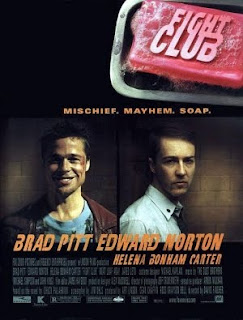Fight Club

I hadn't seen Fight Club since it premiered ten years ago, and I was no more impressed with it yesterday than I was then, but it occurred to me that it couldn't be made today--9/11 changed everything.
The acclaim from some quarter for this film baffles me. Oh, I get it what it's saying about the emasculation of men in a consumer society. But I found the message unappealing and wrong-headed, and the posturing whiny. If your idea of a good time is a men's encounter group, a la Robert Bly in the woods beating on a drum, then I can see the fascination. But to me, Fight Club was pseudo art, as well as pseudo sociology. It was, to cop from Shakespeare, sound and fury, signifying nothing.
Just today I was reading comments about it on Jeff Wells' Hollywood Elsewhere, where supporters cited it as the best film of the 90s. Wrong, it wasn't even the best film of the month (I'd give that to Three Kings) but it certainly is of the 1990s. It came out in 1999, in October, the last few months of the go-go decade, when Brad Pitt could say of his generation that they'd had no great depression, no great war. Now, ten years later, we're flirting seriously with a great depression, and though the war in Iraq and Afghanistan may not be great, it has worked its way under the collective skin of Americans. Perhaps sad to say, but ten years later worrying about losing our manhood by shopping in an Ikea is the least of our worries.
Then, of course, there is the ending, a symphony of destruction involving buildings tumbling to the ground. We are told they are empty buildings, but it's clear to me that the ending would have been rewritten in a post-9/11 world. I would imagine the whole movie would have been rethought as well.
Beyond this, I've never thought it was good just as a movie. The plot concerns a disaffected office drone, Edward Norton, who meets a man on a plane (Pitt) who awakens his inner wild man. They start Fight Club, which is simply men getting a chance to beat each other in fisticuffs. The whole idea of this is abhorrent to me, so I guess I would have been the target of their scorn, but I fail to see the appeal of the entire enterprise. It seems to me that a man's goal would be to become more civilized, not less, but that's just me I guess.
Anyway, Pitt's crusade goes beyond the fight clubs and into first petty vandalism, and then terrorism. Then we find out that Pitt isn't who we think he is, a twist that seems to exist simply for the sake of existing--it doesn't really add to the plot or to the message. Besides that, it doesn't make sense. Fincher attempts to explain it, but it all one can do is cast one's mind back at scenes that don't add up. It's like a showy magic trick.
But I do admire some of the film, particularly some of the dialogue, which has at times a charming brio: "Fuck Martha Stewart!" or Norton saying if given a chance he'd fight William Shatner. The rules of Fight Club have become part of the lexicon: "The first rule of Fight Club is you don't talk about Fight Club," and Helena Bonhan Carter's line: "That's the best fuck I've had since grade school" is a fanboy favorite. Some of Pitt's sermons, such as when he tells his followers that they've been lied to, made to think they'd be movie gods or rock stars, but they won't, or on the mark, but did someone really have to tell them that? They couldn't figure it out for themselves?
Fight Club, to me, masquerades as a great film, but is in reality a shell game, the kind of product that the characters so assiduously come to shun.


Comments
Post a Comment